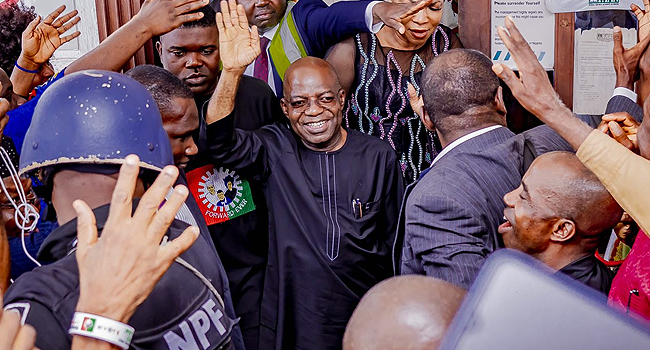Agora Policy, an Abuja-based think tank, has highlighted major risks that need to be closely monitored in Nigeria’s financial sector, following the recent global banking crisis.
The think tank — founded by Waziri Adio, former executive secretary of the Nigeria Extractive Industries Transparency Initiative (NEITI) — made the recommendations in its latest report on Wednesday.
Titled, ‘what does the global banking turmoil mean for Nigeria’s financial sector?’, the report examined the recent collapse of the Silicon Valley Bank (SVB), and the potential implications for local financial firms.
Linking the collapse of the bank to a rise in prices, Agora Policy said severe disruptions to supply chain, as well as efforts by governments globally to support their economies and to minimise the effects of COVID-19 measures, led to a global spike in inflation.
Advertisement
The organisation said the response to a high and rising inflation in many countries was to increase interest rates.
“…and to increase them enough that people remain confident in central banks’ focus on low inflation. From the United States to South Africa, most central banks went into tightening mode, increasing interest rates significantly,” it said.
“A rising interest rate environment can have sometimes unforeseen impacts on banks through various channels. And because banks effectively run a lot on trust, negative sentiment can impact not just the bank in question but others as well, and of course can spillover on the real economy.”
Advertisement
Following a crisis of confidence in banks, the 167-year-old Credit Suisse, a Switzerland-based bank, has been facing liquidity issues.
But the Swiss authorities stepped in to stop a banking crisis in the country, after which UBS, a rival bank, agreed to buy the bank for a price of $3 billion Swiss francs ($3.25 billion).
Similarly, the New York-based Silicon Valley Bank (SVB) was shut down by the US Federal Deposit Insurance Corporation (FDIC) after experiencing a loss of $1.8 billion, and was acquired by HSBC Holdings Plc, a Swiss private bank.
THE NIGERIAN CONTEXT
Advertisement
Analysing the local industry from the same prism, the agency said Nigerian banks have demonstrated that they learned from the banking crisis of 2008.
According to Agora Policy, whether its the 2015 oil price crash or the COVID-19 pandemic, almost all banks have been able to weather the multiple economic shocks that have hit the country’s economy.
“The domestic environment has also been in a tightening cycle for some time,” it added.
“From increasing cash reserve ratios (both general and arbitrary) to actual increases in the monetary policy rate, the banks have had to manage a tighter interest rate environment.
Advertisement
“Although there is no room for complacency, the Nigerian financial system looks to be well prepared to continue managing the higher domestic interest rate environment.”
There are, however, some risks that still need to be assessed and closely monitored, it said.
Advertisement
BANKS’ DIRECT EXPOSURE TO FOREIGN CURRENCY LIABILITIES
The first of these, it said, relates to Nigerian banks’ direct exposure to foreign currency liabilities.
Advertisement
This means foreign currency loans these banks have taken from other global financial institutions.
“Since the crude oil crisis in 2014, foreign currency loans by banks have grown to be a significant portion of foreign exchange inflows,” Agora Policy said.
Advertisement
The organisation disclosed that foreign loans to the Nigerian economy reached, at least, $2 billion a year since 2016, and up to $5 billion in 2019 — “far outpacing foreign direct investment”.
The think tank group said as global interest rates rise, “the costs of servicing these loans will increase”.
“Given that the core revenue streams for most banks are naira-denominated, then there is the potential for a devaluation to add more stress,” it said.
“Anecdotal evidence suggests that most banks with foreign currency liabilities have taken measures to minimise that risk such as by getting into swap agreements with the Central Bank of Nigeria (CBN). Regardless, the risks should be taken note of.
“The external exposure is of course not limited to loans alone. It includes other kinds of foreign currency liabilities and assets that may be affected directly by higher global interest rates.”
FINTECHS
It also said the second risk worth monitoring relates to fintechs.
Agora Policy said this has been a high-growth sector in Nigeria over the last decade and “much of that growth has come in an era of globally cheap financing fuelled by venture capital”.
“These fintechs, however, tend to behave like their global counterparts and so should probably be watched in similar fashion,” the think tank said.
“Do they, like SVB, have most of their assets unhedged in far-maturing securities for instance? Or given their Silicon Valley connections, are they directly exposed to SVB? Given that most fintechs have no experience of operating in the tighter global financing environment, and given how important they have become for Nigeria’s financial landscape, such as their role in facilitating payments for many businesses, a deeper understanding of their risks is needed.”
KEY PRE-EMTIVE MEASURES FROM CBN’S ADVICE TO CENTRAL BANKS
Last week, Godwin Emefiele, governor of the Central Bank of Nigeria (CBN), had advised apex banks and regulators across the world to be vigilant and guard against failures of financial institutions in their jurisdictions.
Commenting on this, the agency said being vigilant and guarding against failures suggests another round of stress tests to identify potential sources of stress to banks and other financial institutions.
The firm also suggested that the CBN governor’s proposition would entail “better and more transparent communication to calm nerves and to ensure that sentiment does not turn against any bank”.
As with every financial crisis, Agora Policy added that Emefiele’s speech means an opportunity to update regulatory frameworks and re-examine which financial institutions need what type of regulations.
It could also mean avoiding policy actions that put unnecessary strain on banks, the agency said, adding that imposing another “cash-crisis type policy on the banks at this time” would not be a good idea.






